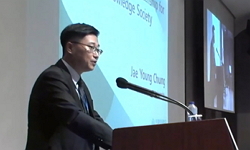본 논문은 디지털 시대의 시민성이 갖는 의미와 한계를 제시하고 이를 바탕으로 디지털 시대 민주시민교육의 방향성을 어디에 두어야 할지 찾고자 한다. 역사적으로 시민, 시민성은 민주주...
http://chineseinput.net/에서 pinyin(병음)방식으로 중국어를 변환할 수 있습니다.
변환된 중국어를 복사하여 사용하시면 됩니다.
- 中文 을 입력하시려면 zhongwen을 입력하시고 space를누르시면됩니다.
- 北京 을 입력하시려면 beijing을 입력하시고 space를 누르시면 됩니다.
https://www.riss.kr/link?id=A109225137
- 저자
- 발행기관
- 학술지명
- 권호사항
-
발행연도
2024
-
작성언어
-
- 주제어
-
KDC
300
-
등재정보
KCI등재
-
자료형태
학술저널
-
수록면
193-220(28쪽)
- 제공처
-
0
상세조회 -
0
다운로드
부가정보
국문 초록 (Abstract)
본 논문은 디지털 시대의 시민성이 갖는 의미와 한계를 제시하고 이를 바탕으로 디지털 시대 민주시민교육의 방향성을 어디에 두어야 할지 찾고자 한다. 역사적으로 시민, 시민성은 민주주의의 발전과 맥락을 같이 했다. 디지털 시대에 맞는 디지털 시민, 디지털 시민성 또한 민주주의와 함께 할 수밖에 없다. 디지털 기술이 극단적으로 발전한 디지털 시대라 할지라도 민주주의는 제도, 생활양식으로 지속될 수밖에 없기 때문이다. 전통적 민주시민교육은 비판적 사고를 바탕으로 정치적 판단 능력, 정치적 행동 능력, 방법론적 능력을 갖춘 시민을 양성하고 또 그러한 시민성 함양을 목적으로 하였다. 그런데 법적·윤리적 규범에, 디지털 리터러시에 그리고 참여와 저항에 초점을 둔 디지털 시민성 또한 추구하는 바는 디지털 공간에서 정치적 판단 능력, 정치적 행동 능력 그리고 방법론적 능력을 갖춘 디지털 시민을 추구한다는 점에서 동일하다. 이러한 차원에서 전통적 시민성과 디지털 시민성이 하나로 구현되기 위해서는 두 시민성의 변증법적 통일이 필요하다. 또한 디지털 시민성은 디지털 세계에만 국한되지 않는다. 그 구현, 실현은 현실 세계에서도 나타난다. 온라인 공간에서의 혐오 표현이 현실 세계에서 사회적 갈등 또는 죽음으로 귀결되기 때문이다. 따라서 디지털 시대 민주시민교육은 디지털 세계와 현실 세계의 변증법적 통일을 구현하는 시민의 양성을 추구하는 방향으로 나아가야 할 것이다.
다국어 초록 (Multilingual Abstract)
This paper aims to present the meaning and limitations of citizenship in the digital age and, based on this, to identify the direction of democratic citizenship education in the digital age. Historically, citizens and citizenship have developed in the...
This paper aims to present the meaning and limitations of citizenship in the digital age and, based on this, to identify the direction of democratic citizenship education in the digital age. Historically, citizens and citizenship have developed in the context of democracy. Digital citizens and digital citizenship, suitable for the digital age, must also inevitably align with democracy. Even in an era of extreme digital technological advancement, democracy must persist as both an institution and a way of life. Traditional democratic citizenship education has aimed to cultivate citizens with critical thinking skills, political judgment abilities, political action abilities, and methodological abilities, with the goal of fostering such citizenship. Similarly, digital citizenship, which focuses on legal and ethical norms, digital literacy, participation, and resistance, pursues the goal of developing digital citizens with political judgment abilities, political action abilities, and methodological abilities in digital spaces. In this respect, a dialectical unity of traditional citizenship and digital citizenship is necessary for their integration. Additionally, digital citizenship is not confined to the digital world; its implementation and realization also manifest in the real world. This is because hate speech in online spaces can lead to social conflicts or even death in the real world. Therefore, democratic citizenship education in the digital age should aim to cultivate citizens who embody the dialectical unity of the digital and real worlds.
목차 (Table of Contents)
- Ⅰ. 서론
- Ⅱ. 전통적 의미의 시민, 시민성, 민주시민교육과 디지털 시대
- Ⅲ. 디지털 기술이 초래하는 어두운 이면
- Ⅳ. 디지털 시민성에 대한 다양한 논의
- Ⅴ. 민주시민교육의 관점에서 본 디지털 시민성 논의의 의미 및 한계
- Ⅰ. 서론
- Ⅱ. 전통적 의미의 시민, 시민성, 민주시민교육과 디지털 시대
- Ⅲ. 디지털 기술이 초래하는 어두운 이면
- Ⅳ. 디지털 시민성에 대한 다양한 논의
- Ⅴ. 민주시민교육의 관점에서 본 디지털 시민성 논의의 의미 및 한계
- Ⅵ. 결론
- Reference
동일학술지(권/호) 다른 논문
-
Impact of earnings management on financial performance
- 호남대학교 인문사회과학연구소
- 임대규(Daekyu Lim)
- 2024
- KCI등재
-
- 호남대학교 인문사회과학연구소
- Nuwagaba
- 2024
- KCI등재
-
- 호남대학교 인문사회과학연구소
- 편집부
- 2024
- KCI등재
-
체육 전공 대학생과 비체육 전공 대학생의 쓰기 능숙도 비교 연구 - 어휘 다양성 및 통사적 복잡성을 중심으로
- 호남대학교 인문사회과학연구소
- 박창범(Chang Beom Park)
- 2024
- KCI등재





 스콜라
스콜라






